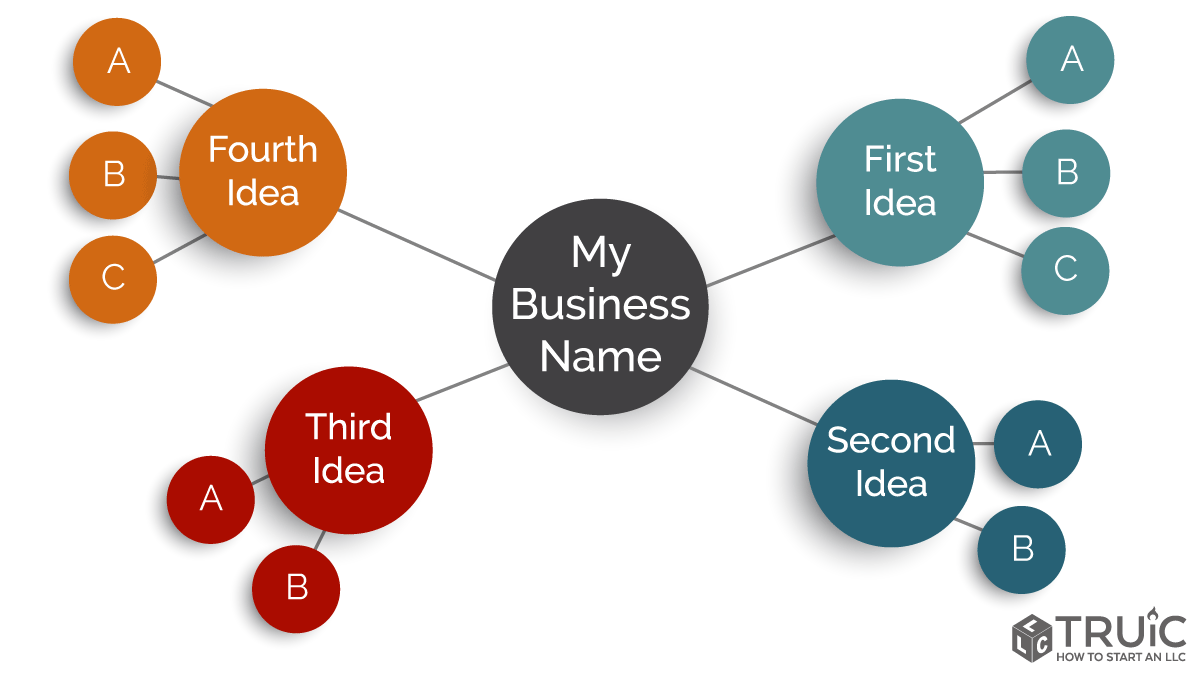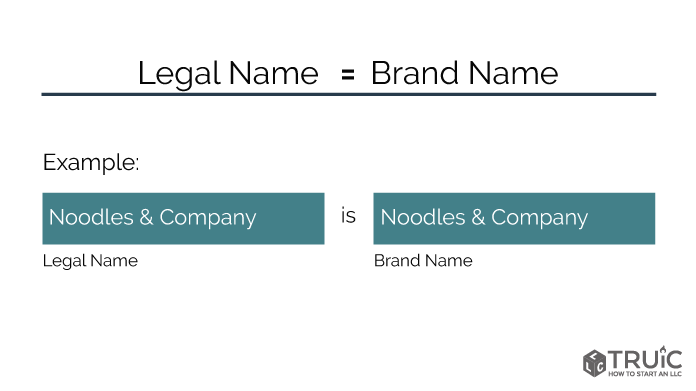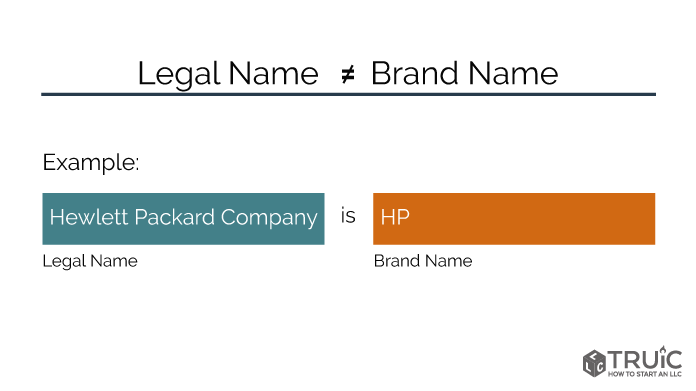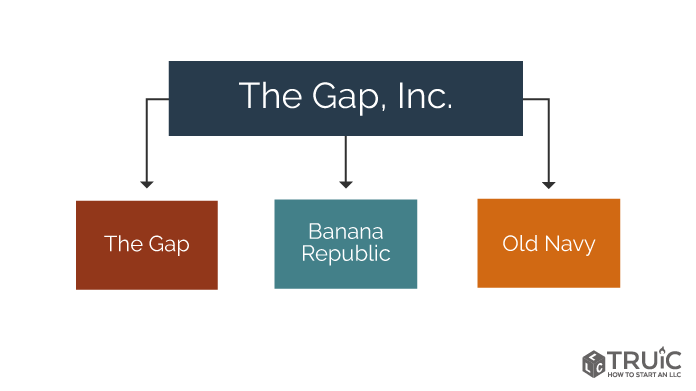How To Name A Business
There are three steps to naming your business:
- Come up with the best brand name for your business
- Follow the naming rules for your business structure
- Check if Your Business Name is Available
Recommended: Use our Business Name Generator to brainstorm hundreds of catchy business name ideas.

How To Come Up With A Business Name
Naming your business is one the most important and challenging steps for entrepreneurs. How you decide to brand your business will play a large role in your success.
In this video, we break down the naming process into three steps: choosing your business structure, picking a branding strategy, and making sure your name is unique.
Visit our state-specific naming guides to learn how to come up with a business name in your state:
- Alabama
- Alaska
- Arizona
- Arkansas
- California
- Colorado
- Connecticut
- Delaware
- Florida
- Georgia
- Hawaii
- Idaho
- Illinois
- Indiana
- Iowa
- Kansas
- Kentucky
- Louisiana
- Maine
- Maryland
- Massachusetts
- Michigan
- Minnesota
- Mississippi
- Missouri
- Montana
- Nebraska
- Nevada
- New Hampshire
- New Jersey
- New Mexico
- New York
- North Carolina
- North Dakota
- Ohio
- Oklahoma
- Oregon
- Pennsylvania
- Rhode Island
- South Carolina
- South Dakota
- Tennessee
- Texas
- Utah
- Vermont
- Virginia
- Washington
- Washington D.C.
- West Virginia
- Wisconsin
- Wyoming
Subscribe to our YouTube channel
Step 1: Find The Best Brand Name For Your Business
First, we will start with the creative work of naming your business. Then, it’s time to consider your branding strategy. After that, you'll want to understand the naming rules for your business structure.
If you'd like to explore business name ideas for your new venture right away, check out our Business Name Generator tool.
Brainstorm Business Names
You should start by brainstorming at least 4-5 potential names. The goal is to come up with at least a few catchy and creative names. Then, we will help you make sure the names you chose are available.
A good brainstorming session lasts for about 15-45 minutes and it’s important that you are comfortable in all ways— think snacks and water, a comfortable chair, your favorite pen.
Use a timer and then stop when it goes off. If you need more time, take a 15 minute break and start your timer again. The more you brainstorm, the better.
Creative Brainstorming Techniques:
- Visualization. It might help to close your eyes and picture yourself as a consumer in the type of business you want to start. What are the words that you would use to describe the product, the services, and the atmosphere? Think of adjectives you would use to convey that kind of environment.
- Word-association. Start by writing a couple of random words. Next, write down words that tie your two random words to your business's mission, service, or product. This exercise is meant to tease-out buried ideas.
- Free Writing. Keep your pen on the paper until your timer goes off. Don’t limit your ideas, don’t analyze whether they are good or bad. Just keep writing.
- Get personal. Draw upon familar experiences relating to meaningful memories and ways in which you could make others feel the same through language. Also, you can either use your own name, last name, the name of a mentor, or that of someone else who is significant to you.
- Rhymes. One popular form of word play to help you find a business name idea is rhyming. Think of similar sounding words that relate to your business and put them together. For instance, if you're starting a laundromat business, you can name it "Spinnin' Linen."
- Acronyms. A simple business naming method can be creating a standard business name and using an acronym. One example is TRUiC — The Really Useful Information Company — where it describes the purpose of the company.
- Synonyms. The most creative names are derived from synonyms that can describe your business by using more unique, similar words. One simple way to do this is by performing a Google search on words that describe or relate to your business. For example, if you're starting a business as a make-up artist, you may think of words that relate to beauty; some beauty synonyms include pretty, stunning, and gorgeous.
- Mind Map. Start with a circle containing the words “my business name.” Draw a line off of the main circle with each new idea. A web of ideas will form during your brainstorming session.

Naming Tip
If you don’t love the name you choose the first time, most states allow you to set up a DBA later. A DBA allows you to operate your business under a different name without doing a full legal name change.
12 Questions To Ask When Choosing A Brand Name
Now that you’ve come up with name choices, it’s time to think about some important tips for naming a business.
12 Important Questions to Ask Yourself:
- Is my name simple?
- How does the name sound when I say it out loud?
- Is the name easy to pronounce and spell and does the acronym look ok?
- Is my business name shorter rather than longer?
- Did I include a geographic location in my name? Usually, you shouldn't.
- What do other people think of the name?
- How does the name compare to other business names in the industry?
- Does the name convey my mission as a business?
- Did I avoid trends?
- Does my name contain obscure words?
- Is my name too narrow or too literal?
- Is my name memorable?
Recommended: Check out these 12 Tips for Naming Your Small Business.
Choose Your Branding Strategy
The next big decision you will need to make is whether your legal business name will be your brand name or if your brand will be separate from your legal name.
Most business owners prefer to use the business’s legal name as their brand name.
Legal Name: Your business's legal name is the name that is listed on your formation documents.
Brand Name: Your business's brand name is the name that you use to market your company. It is the name that clients see and use.
Informal businesses, like sole proprietors and general partnerships, are almost always required to use their surname(s) as their legal name.
Recommended: Check out some of our most popular Online Business Ideas and Low-Cost Business Ideas if you’re still looking for a business idea to put a name to.
There Are Three Main Branding Strategies:
1. The business's legal name is also the brand name. If you are forming an LLC or corporation, you will register your legal name when you file your formation documents.

2. The business has a legal name that is different than its brand name. If you choose to have a different brand name, you will need to file a DBA (if allowed in your state). To learn more, visit our easy step-by-step DBA guide on Startupsavant.com.

3. The business has a legal name and multiple brand names. If you choose to have multiple brand names, you will need to file for a DBA (if allowed in your state). You can learn more about branding with a DBA on our What is a DBA page.

DBA
When a business uses a name besides their legal name, they create a DBA (doing business as). A DBA is sometimes called an assumed name, fictitious name, or trade name.
Consider Using a DBA to Brand or Rebrand Your Business
Most states allow you to set up a DBA (doing business as). A DBA allows you to use a name other than your business’s legal name.
If you don’t love the name you pick the first time or if things change that make your name obsolete, you can usually create a DBA name and legally operate under a new name.
DBA For Your Business Structure
Owners of formal business types like LLCs and Corporations sometimes choose to create multiple brands or rebrand their businesses with a DBA. Most sole proprietors and general partnerships need to use a DBA to create a brand other than their surnames. You can learn more about filing a DBA in your state on our How To File a DBA guide.
After you get your business name, your next step is getting a unique logo. Get your unique logo using our Free Logo Generator.

Have a question? Leave a Comment!
Ask us a question, tell us how we're doing, or share your experiences. Join the conversation in our Comment Section.
Have a question? Leave a Comment!
Ask us a question, tell us how we're doing, or share your experiences. Join the conversation in our Comment Section.

Step 2: Follow The Naming Rules For Your Business Structure
Choosing a business structure for your new venture is an important step because different business structures have different naming rules.
Business structures can be formal or informal and are the way your business is set up, operated, and taxed. We cover the following business structure naming rules:
- Common formal business structures
- Common informal business structures
Limited Liability Company (LLC)
An LLC is the simplest way of structuring your business to protect your personal assets in case your business is sued. You'll want to do an LLC name search to make sure your name is unique in the state you're forming an LLC (e.g., Florida LLC search).
For your state's LLC naming rules, select your state from the drop-down above.
Common LLC Naming Rules:
- Your name must include the phrase “limited liability company,” or one of its abbreviations (LLC or L.L.C.).
- Your name cannot include words that could confuse your LLC with a government agency (FBI, Treasury, State Department, etc.).
- Restricted words (e.g. Bank, Attorney, University) may require additional paperwork and a licensed individual, such as a doctor or lawyer, to be part of your LLC.
Recommended: Learn How to Form an LLC in your state using our free guide.
C Corporation
C Corporation (C Corp) is a separate legal entity from its owners with a basic operational structure consisting of shareholders, officers, directors, and employees. A C corp business structure will protect your personal assets.
For your state's corporation naming rules, select your state from the drop-down above.
Common Corporation Naming Rules:
- Your name must contain the word “corporation,” “company,” “incorporated,” “limited” or an abbreviation of one of these terms.
- Your name must be distinguishable from any existing business in your state.
- Your name cannot include words that could confuse your corporation with a government agency (FBI, Treasury, State Department, etc.).
Recommended: Learn How to Start a Corporation in your state by following the guides on Startup Savant.
Sole Proprietorship
A sole proprietorship is the simplest business type in the United States. A sole proprietorship is an informal business structure and does not provide personal asset protection.
Sole Proprietorship Naming Rules:
This business structure must operate under the surname of the owner. To use a different name for a sole proprietorship, the owner must file for a DBA (doing business as), also known as an assumed name, fictitious name, or trade name.
General Partnership
General partnerships are similar to sole proprietorships. The difference is that a partnership consists of 2 or more people. A general partnership is an informal business structure and does not provide personal asset protection.
General Partnership Naming Rules:
General partnerships must include the surnames of the partners. Similar to sole proprietorships, the partnership owners must file a DBA (doing business as) to use a different name.
Recommended: Read our What is a DBA article to learn more about what a DBA is, isn’t, and what it means to get one for your business.
S Corporation
An S Corporation (S Corp) is a tax structure, not a business structure. You can call your business an “S corp” but really it’s either a corporation or an LLC.
If your business is taxed as an S Corp, you should follow your state’s naming requirements for either a corporation or an LLC, depending on your business structure.
Step 3: Check If Your Business Name is Available
The final step for naming your business is making sure it's unique on the state and federal levels and that it's available as a domain name.
Visit our state-specific Business Name Search guides for instructions on how to find out if your business name is unique.
Federal Trademark Search
Next, a quick search on the U.S. Trademark Electronic Search System will tell you whether someone else has already trademarked your name. Once you know the name is available, you can choose to apply for a trademark for your business but the cost is sometimes too high for a startup or fledgling business.
Regardless of whether you will be registering, it’s good to know if your name is already taken.
To learn more about trademarks and the steps you will need to get one, read our How to Trademark Your Business article.
How to Register a Business Name
Now that you have a unique business name that's available in your state, you will need to register that business name in your state. To do this, depending on your business's needs, you will need to:
- Reserve a name (Example: Florida LLC Lookup)
- Form an LLC or Corporation
- File for a DBA
- Or submit an amendment to the legal name if you're looking to change your existing business's name.
Learn how to register a business name in your state:
- Alabama
- Alaska
- Arizona
- Arkansas
- California
- Colorado
- Connecticut
- Delaware
- Florida
- Georgia
- Hawaii
- Idaho
- Illinois
- Indiana
- Iowa
- Kansas
- Kentucky
- Louisiana
- Maine
- Maryland
- Massachusetts
- Michigan
- Minnesota
- Mississippi
- Missouri
- Montana
- Nebraska
- Nevada
- New Hampshire
- New Jersey
- New Mexico
- New York
- North Carolina
- North Dakota
- Ohio
- Oklahoma
- Oregon
- Pennsylvania
- Rhode Island
- South Carolina
- South Dakota
- Tennessee
- Texas
- Utah
- Vermont
- Virginia
- Washington
- Washington D.C.
- West Virginia
- Wisconsin
- Wyoming
Recommended: Read our How to Register a Business Name guide for information on all of these types of registrations.
Naming Your Business FAQ
How Do I Name My Small Business?
Naming a small business is often a do-it-yourself job. Small business startup budgets usually won’t support hiring someone to help name your business. For easy step-by-step instructions on naming your small business, visit our how to name a business state guides.
How do I come up with a catchy business name?
The first step to naming your business is figuring out what business structure you will use for your new company. After that, you will brainstorm at least 4-5 possible names. The more you brainstorm the better. Once you have some names, you can test the names against best practices, name availability, and state guidelines.
Not sure what to name your business? Check out our LLC Name Generator.
Should you name your business after yourself?
Naming your business after yourself has its benefits. Unless you have a name like John Smith, your name can help you find a .com domain name. If you are coming up with innovative ideas or a new approach, using your name can help create a strong brand.
There are also reasons NOT to name your business after yourself. If you don’t want to be the face and name of your business, it won’t work. If your type of client or customer base would prefer a company name, then you should give them a company name to work with. If you want your business to someday run on it’s own, without you working there every day, then you shouldn’t use your name.
Can I sell my trademark or buy someone else’s?
Yes, you can sell or buy a trademark. A trademark is considered intellectual property which means it can be sold like property. It’s important to consult with an attorney before buying or selling intellectual property, especially trademarks.
Is my trademark application public?
Yes, your trademark application, including your personal identification information, is public. By law, your trademark information must be easily searchable by the public.
Where should I buy my domain name?
Our top choice in web hosting and domain registrars is GoDaddy. We like their domain search tool-- you can search for the exact name you want or make suggestions based on keywords and available names. There are also several other companies to choose from that will provide a good experience.
Visit GoDaddy to search for domain names.
Can I put the word “company” in my business name?
You can only use the word “company” in your business name if your business is a corporation.
Do I have to write LLC after my company name?
If you choose to use a limited liability company structure for your new business, most states will require that you use LLC after the name. You can also use the full term, limited liability company.